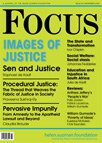‘Justice’ is a protean concept. ‘Law and order’ are maintained by governments and ruling elites in its name.
Focus 55 - November 2009 - Images of Justice

Education has the potential to play a key role in addressing societal injustice by equalising opportunities, facilitating development, and strengthening democracy.

‘Justice’ is a protean concept. ‘Law and order’ are maintained by governments and ruling elites in its name. Revolutions and popular insurrections are conducted under its legitimating aegis.
Revolutionary wars became a feature of modern history after the American Revolution of 1776. It is no accident that the word “guerrilla” – whose original meaning was mini-war – derives from precisely such an experience in the mountains of Spain during the Napoleonic Wars.

The Greek poet Archilochus offers an illuminating prism though which to view Anthea Jeffery’s voluminous and illuminating book on the struggle for South Africa that led eventually to the triumph of the African National Congress and its installation as the governing party in 1994, even though Archilochus lived in the seventh century BC.
Anthea Jeffery’s central thesis in her book, People’s War: New Light on the Struggle for South Africa, that the ANC deliberately killed thousands of South Africans in a scorched earth strategy to capture power at all costs from the Nationalist government in the dying days of apartheid, is simply not true.
Nation-wide reaction to the court proceedings against the ‘Reitz four’ students, and the University of the Free State’s dropping of internal charges against them for their degrading treatment of the University’s female employees has recently highlighted the possible connection between the template of forgiveness central to the Truth and Reconciliation Commission (TRC) and attitudes and events shaping contemporary South African society.
This article focuses primarily on procedural justice with particular reference to the Constitution of the Republic of South Africa of 1996 and the justice system in South Africa.

South Africa’s democratic transition in 1994 was not only a transformative change to political institutions and political process.
It is now familiar that under Thabo Mbeki the democratic project experienced several major reversals.

Amartya Sen, the Nobel Prize winning economist, has recently – to wide and highly influential critical acclaim – published The Idea of Justice, a major, brilliant, book of great erudition and scope.

